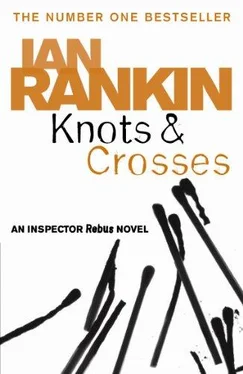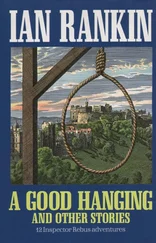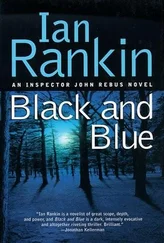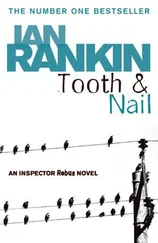He nodded, then watched her leave, making for her own office in her own part of the building. Rebus wasn’t sure which desk was his any more. He surveyed the room. It all seemed different somehow, as though a few of the desks had been changed around or put together. A telephone rang on the desk next to him. And though there were officers and telephonists nearby, he picked it up himself, making an attempt to get back into the investigation. He prayed that he was not himself the investigation. He prayed, forgetting what prayer was.
‘Incident Room,’ he said. ‘Detective Sergeant Rebus speaking.’
‘Rebus? What a curious name that is.’ The voice was old but lively, certainly well-educated. ‘Rebus,’ it said again, as though jotting it down onto a piece of paper. Rebus studied the telephone.
‘And your name, sir?’
‘Oh, I’m Michael Eiser, that’s E-I-S-E-R, Professor of English Literature at the University.’
‘Oh, yes, sir?’ Rebus grabbed a pencil and jotted down the name. ‘And what can I do for you, sir?’
‘Well, Mister Rebus, it’s more a case of what I think I can do for you, though of course I may be mistaken.’ Rebus had a picture of the man, if this were not a hoax call: frizzy-haired, bow-tied, wearing crushed tweeds and old shoes, and waving his hands about as he spoke. ‘I’m interested in word-play, you see. In fact I’m writing a book on the subject. It’s called Reading Exercises and Directed Exegetic Responses. Do you see the word-play there? It’s an acrostic. The first letter of each word makes up another word — reader, in this case. It’s a game as old as literature itself. My book, however, concentrates on its manifestation in more recent works. Nabokov and Burgess and the like. Of course, acrostics are a small part of the overall set of ploys used by the author to entertain, direct or persuade his audience.’ Rebus tried to interrupt the man, but it was like trying to interrupt a bull. So he was forced to listen, wondering all the time if it were a crank call, if he should — strictly against procedure — simply put down the telephone. He had more important things to think about. The back of his head ached.
‘… and the point is, Mister Rebus, that I have noticed, quite by chance, a kind of pattern in this murderer’s choice of victims.’
Rebus sat down on the edge of the desk. He clasped the pencil as though trying to crush it.
‘Oh, yes?’ he said.
‘Yes. I have the names of the victims here in front of me on a piece of paper. Perhaps one would have noticed it sooner, but it was only today that I saw a report in one newspaper which grouped the poor girls together. I usually take The Times, you see, but I quite simply couldn’t find one this morning, so I bought another paper, and there it was. It may be nothing at all, mere coincidence, but then again it may not. I’ll leave that for you chaps to decide. I merely offer it as a proposition.’
Jack Morton, puffing smoke all around him, entered the office and, noticing Rebus, waved. Rebus jerked his head in response. Jack looked worn out. Everyone looked worn out, and here he was, fresh from a period of rest and relaxation, dealing with a lunatic on the telephone.
‘Offer what exactly, Professor Eiser?’
‘Well, don’t you see? In order, the victims’ names were Sandra Adams, Mary Andrews, Nicola Turner, and Helen Abbot.’ Jack slouched towards Rebus’s table. ‘Taken as an acrostic,’ continued the voice, ‘their names make up another name — Samantha. The murderer’s next victim perhaps? Or it may be simple coincidence, a game where no game really exists.’
Rebus slammed down the telephone, was off the desk in a second, and pulled Jack Morton around by his neck-tie. Morton gasped and his cigarette flew from his mouth.
‘Got your car outside, Jack?’
Still choking, he nodded a reply.
Jesus Christ, Jesus Christ. It was all true then. It was all to do with him. Samantha. All the clues, all the killings had been meant merely as a message to him. Jesus Christ. Help me, oh help me.
His daughter was to be the Strangler’s next victim.
Rhona Phillips saw the car parked outside her house, but thought nothing of it. All she wanted was to get out of the rain. She ran to the front door, Samantha following desultorily behind, and keyed open the door.
‘It’s horrible outside!’ she shouted into the living-room. She shook off her raincoat and walked through to where the TV still blared. In his chair, she saw Andy. His hands were tied behind him and his mouth was taped shut with a huge piece of sticking-plaster. The length of twine still dangled from his throat.
Rhona was about to let out the most piercing scream of her life, when a heavy object came down on the back of her head and she staggered forward towards her lover, slumping across his legs as she passed out.
‘Hello, Samantha,’ said a voice she recognised, though his face was masked so that she could not see his smile.
Morton’s car tore across town, its blue light flashing, as though it were being followed by all Hell itself. Rebus tried explaining it all as they drove, but he was too edgy to make much sense, and Jack Morton was too busy avoiding traffic to make much attempt at taking it in. They had called for assistance: one car to the school in case she were still there, and two cars to the house, with the warning that the Strangler might be there. Caution was to be exercised.
The car reached eighty-five along Queensferry Road, made an insane right turn across the oncoming traffic, and reached the bright-as-a-pin housing estate where Rhona, Samantha and Rhona’s lover now lived.
‘Turn right here,’ shouted Rebus over the engine’s roar, his mind clinging to hope. As they turned into the street they saw the two police cars already motionless in front of the house, and Rhona’s car sitting like a potent symbol of futility in the driveway.
They wanted to give him sedatives, but he wouldn’t take any of their drugs. They wanted him to go home, but he would not take their advice. How could he go home with Rhona lying somewhere above him in the hospital? With his daughter abducted, his whole life ripped apart like a worn garment being transformed into dusters? He paced the hospital waiting-room. He was fine, he told them, fine. He knew that Gill and Anderson were somewhere along the corridor. Poor Anderson. He watched from the grime of the window as nurses walked by outside, laughing in the rain, their capes blowing about them like something out of an old Dracula movie. How could they laugh? Mist was settling over the trees, and the nurses, still laughing, unaware of the world’s suffering, faded into that mist as though some Edinburgh of the past had sucked them into its fiction, taking with them all the laughter in the world.
It was nearly dark now, the sun a memory behind the heavy fabric of the clouds. The religious painters of old must have known skies like this, must have lived with them each and every day, accepting the bruised colouring of the clouds as a mark of God’s presence, an essence of creation’s power. Rebus was no painter. His eyes beheld beauty not in reality but in the printed word. Standing in the waiting-room, he realised that in his life he had accepted secondary experience — the experience of reading someone else’s thoughts — over real life.
Well, he was face to face with it now all right: he was back in the Paras, he was back in the SAS, his face a sketch-pad of exhaustion, his brain aching, every muscle tensed.
He caught himself beginning to abstract everything again, and slapped the wall with the palms of both hands as though ready to be frisked. Sammy was out there somewhere in the hands of a maniac, and he was composing eulogies, excuses and similes. It wasn’t enough.
Читать дальше












